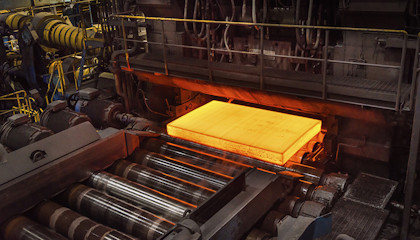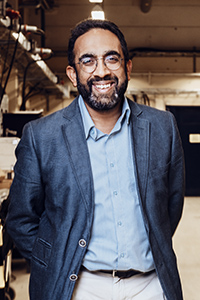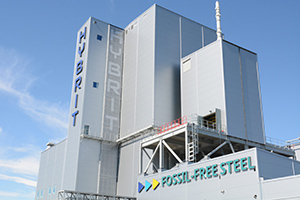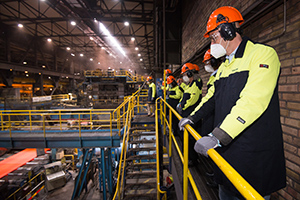Countdown to zero

The Swedish steel industry’s quest for fossil-free production has made electric heating solutions hotter than ever. In a strategic partnership, Kanthal is designing and providing groundbreaking heating technology that will enable the world’s first fossil-free ore-based steel.
Steel is one of the world’s most versatile and recyclable materials. At the same time, steel production accounts for 7 percent of global CO2 emissions, making it one of the highest carbon dioxideemitting industries. Hence, the decarbonization of the steel industry would have a huge impact on the environment and enable other carbon-intensive industries world-wide to follow suit. Sweden, where the steel industry accounts for as much as 10 percent of the country’s CO2 emissions, has already taken the first steps toward a fossil-free value chain from mine to steel. Sandvik is responsible for supplying the electric heating solution, a core element in the new, more sustainable technology under development.
Reaching zero emissions
The Swedish target of reaching zero emissions by 2045 has challenged the industry. Hybrit, which stands for “hydrogen breakthrough ironmaking technology,” is a joint venture between the steel company SSAB, the mining company LKAB and the power company Vattenfall.
 Dilip Chandrasekaran, Kanthal
Dilip Chandrasekaran, Kanthal
The goal is to replace the coal used in the traditional furnace heating process with a direct reduction process based on hydrogen produced with fossil-free electricity. The road map that has been set up is tight and involves the SSAB offer of fossil-free steel on the market by 2026.
“To succeed, the project requires an efficient and fossil-free process to heat the hydrogen, and this is where we enter the picture,” says Dilip Chandrasekaran, Head of Research and Development at Sandvik Division Kanthal, a world leader in the area of industrial heating technology and resistance materials.
The first delivery
Chandrasekaran says he finds it satisfying to be able to use the Kanthal application know-how in an environmental game changer such as the Hybrit project. “We have the full range of materials to heat entire processes up to 2,000 degrees Celsius,” he says. “The Hybrit challenge is to make a large-scale heater that is a thousand times more powerful than the 50- to 100-kilowatt heaters we normally make.”
A lot of people didn't believe in the idea, which requires that you repace a production method that has worked for a thousand years.
 The Hybrit pilot plant, Sweden.At a news conference at the company’s Oxelösund site in Sweden, where the first delivery of fossil-free steel was presented, SSAB CEO Martin Lindqvist commented: “When we started Hybrit five years ago, a lot of people didn’t believe in the idea, which requires that you replace a production method that has worked for a thousand years. Now we have proved that it’s possible.”
The Hybrit pilot plant, Sweden.At a news conference at the company’s Oxelösund site in Sweden, where the first delivery of fossil-free steel was presented, SSAB CEO Martin Lindqvist commented: “When we started Hybrit five years ago, a lot of people didn’t believe in the idea, which requires that you replace a production method that has worked for a thousand years. Now we have proved that it’s possible.”
Hybrit currently operates a pilot plant in northern Sweden, where the first Kanthal® heater is ready for testing. The heater is in the 250-kilowatt range, and if it proves successful it will be upgraded to a 1-megawatt version. The goal is to develop a large-scale heating solution that could heat high volumes of hydrogen up to 1,000°C (1,832°F).
A unique project
“This is a unique project where we develop new groundbreaking technology in collaboration with the customer,” says Chandrasekaran.
 Press conference at the SSAB plant.
Press conference at the SSAB plant.
“The knowledge we acquire in the process has the potential to make an even bigger difference and on a global scale, as there is a huge interest in making a changeover to fossil-free processes in the cement and petrochemical industries as well.”
Says Lindqvist, “The interest in fossil-free steel is bigger than the supply, and we will have competition ahead. But while they are planning and discussing, we deliver.”
This is Hybrit
Hybrit is an initiative, funded in part by the Swedish National Energy Agency, to bring fossil-free steel to the market. The most significant step toward reducing CO2 emissions in the steelmaking process is to replace the traditional blast furnaces with hydrogen-based direct reduction plants, where hydrogen replaces coke as the main reductant. Instead of hot metal, the end product is sponge iron. The sponge iron is melted in an electric arc furnace for further processing to produce steel. Kanthal develops the electric gas heating solution for the hydrogen-based direct reduction plant. Sandvik uses a different process for its production of steel and is thus not part of Hybrit.